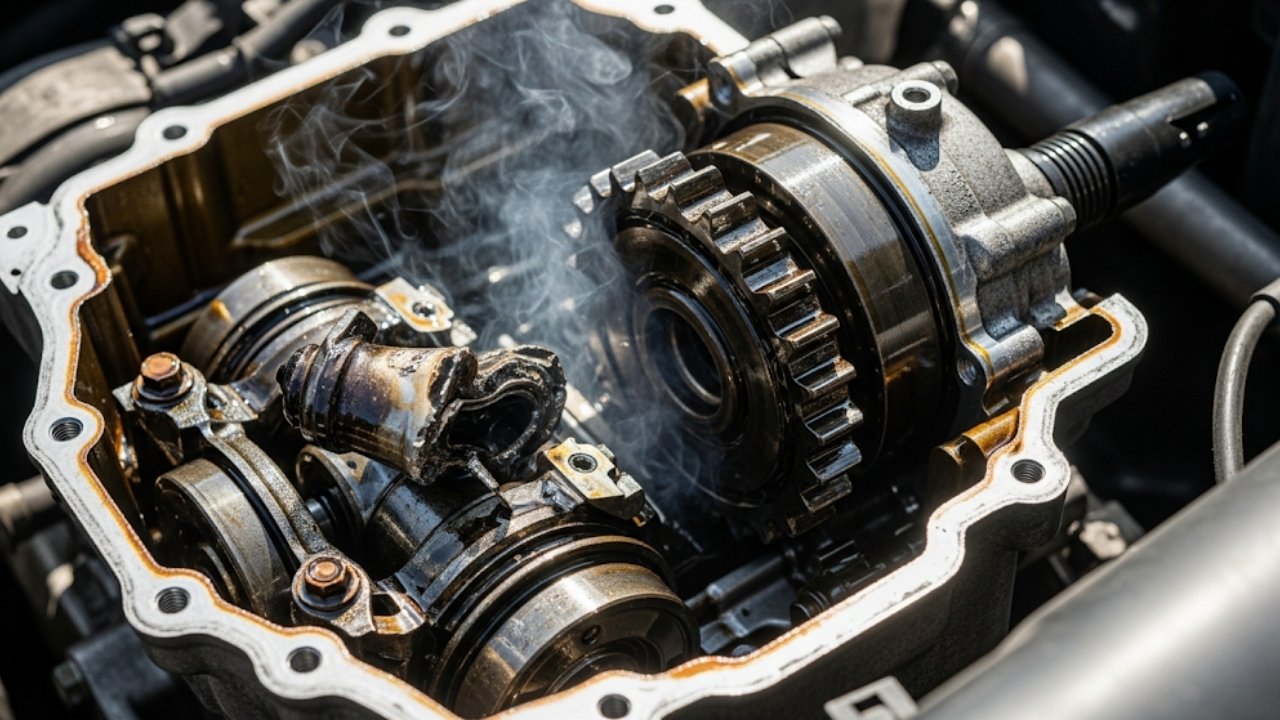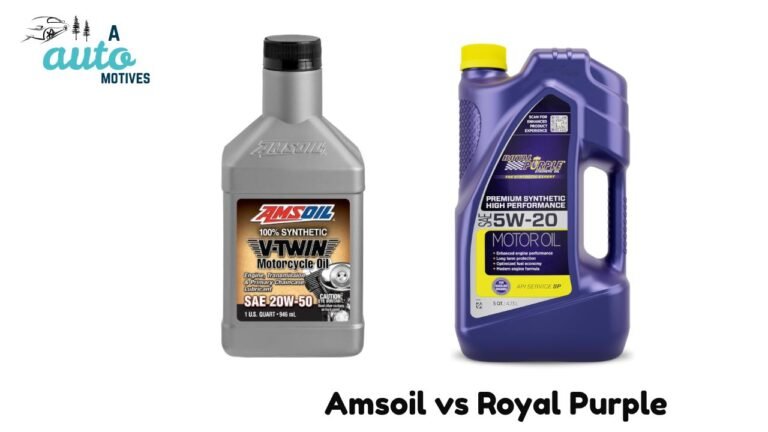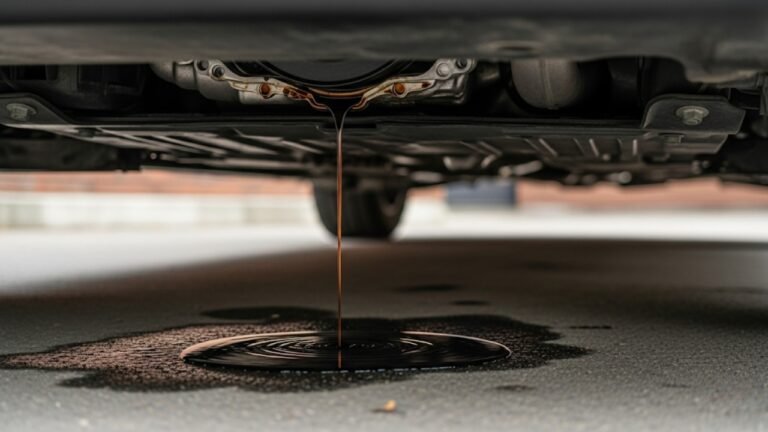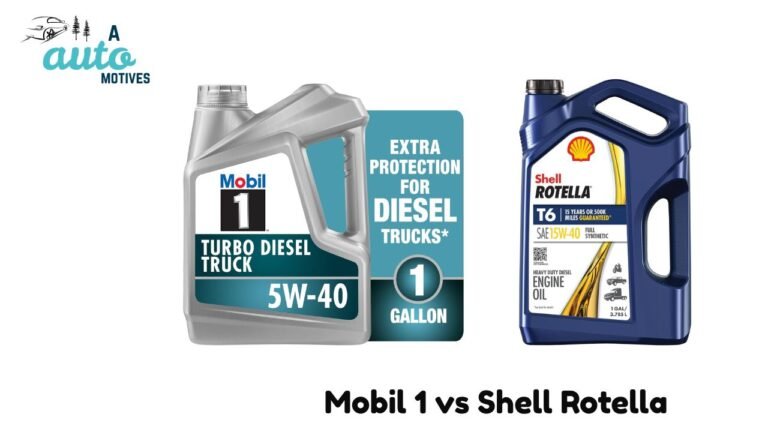What Happens to Your Car If You Run Out of Oil?

Imagine this: you’re cruising down the highway, music turned up, windows down, everything feels right. Then, out of nowhere, a strange ticking noise starts coming from under the hood. You ignore it. A few miles later, the engine sputters, stalls, and dies. You pull over, confused and frustrated—only to find out you’ve run out of oil.
What happens to your car if you run out of oil isn’t just a mechanical issue—it can feel like your vehicle’s soul has been ripped apart. That might sound dramatic, but oil is more than just a dark, greasy liquid. It’s the lifeblood of your engine.
In this article, we’re diving deep into the real damage, what causes it, what signs to look for, and how to avoid it. We’ll keep it simple, friendly, and practical—like advice from a buddy who’s been through it all.
In This Article
- 0.1 Why Oil Matters More Than You Think
- 0.2 What Happens to Your Car If You Run Out of Oil?
- 0.3 Real Talk: I’ve Seen This Happen
- 0.4 Early Warning Signs You Should Never Ignore
- 0.5 Table: Stages of Damage When Running Without Oil
- 0.6 Bullet Points: Consequences of No Oil
- 0.7 Myth Buster: Can’t I Just Top It Off Later?
- 0.8 How Often Should You Check Your Oil?
- 0.9 How to Prevent Oil Loss in the First Place
- 0.10 Oil Light Came On? Here’s What You Should Do
- 1 What Happens to Your Car If You Run Out of Oil? (Continued)
- 1.1 Some Engines Suffer More Than Others
- 1.2 Biggest Mistakes People Make
- 1.3 Can Synthetic Oil Save You in a Crisis?
- 1.4 Emotional Toll: It’s More Than Just Money
- 1.5 FAQs: What Happens to Your Car If You Run Out of Oil
- 1.5.1 1. Can I just add oil after running out and keep driving?
- 1.5.2 2. How long can a car run without oil?
- 1.5.3 3. How do I know my car is out of oil?
- 1.5.4 4. Will insurance cover engine damage from no oil?
- 1.5.5 5. Is a seized engine repairable?
- 1.5.6 6. How often should I check my oil?
- 1.5.7 7. What should I do if I suspect a slow oil leak?
- 1.5.8 8. Can low oil cause your car not to start?
- 1.6 Final Thoughts: Protect Your Engine, Protect Yourself
Why Oil Matters More Than You Think

Here’s what engine oil really does:
-
Lubricates moving parts to prevent metal-on-metal contact
-
Cools engine components by reducing heat buildup
-
Cleans away debris and sludge from internal surfaces
-
Prevents corrosion and wear
-
Maintains engine efficiency and performance
Without it? You’re practically asking your engine to run a marathon barefoot on hot asphalt.
What Happens to Your Car If You Run Out of Oil?
Let’s get straight to the core question. When your car runs out of oil, here’s what you’re actually doing to it:
1. Friction Takes Over Fast
Once oil is gone, metal starts grinding against metal. Friction builds up almost instantly. Think of a bike chain without grease—it squeaks, strains, and eventually snaps. Now imagine that happening at 4,000 RPM inside your engine.
2. Parts Overheat and Warp
Engines generate a ton of heat. With oil gone, there’s nothing to draw the heat away. Pistons can swell and seize, crankshafts can bend, and cylinder walls can crack. That’s serious, irreversible damage.
3. The Engine Will Eventually Seize
Within minutes—sometimes seconds—of running dry, your engine could seize. That means it literally locks up and stops working. You’ll hear knocking, ticking, or clanking noises right before it dies. At that point, you’re probably looking at a total engine replacement.
Real Talk: I’ve Seen This Happen
Let me share a story. A friend of mine, Arif, ignored his oil light for three weeks. He kept saying, “I’ll check it this weekend.” Spoiler alert—he didn’t.
One morning, on his way to work, his Toyota Camry started knocking. Ten minutes later, the engine died. The mechanic said his engine was cooked. It cost him $3,200 to replace it. The worst part? A bottle of oil only cost $10. True story.
Early Warning Signs You Should Never Ignore
If you’re wondering, “How will I know if my oil is low?”—great question. Your car usually warns you, but you have to listen.
Common Red Flags:
-
Oil warning light comes on
-
Burning oil smell inside or outside the car
-
Engine making ticking, tapping, or knocking sounds
-
Overheating or high engine temperature
-
Rough idling or stalling
If you notice any of these signs, stop driving immediately and check your oil level.
Table: Stages of Damage When Running Without Oil
Here’s a simple breakdown of how quickly damage happens once oil is gone:
| Time Without Oil | What Happens | Level of Damage |
|---|---|---|
| 0–30 seconds | Engine heats rapidly, ticking sounds start | Light wear |
| 30 seconds–2 mins | Parts begin to warp and seize from friction | Serious internal damage |
| 2–5 minutes | Engine components melt, seize, and shut down | Complete engine failure |
| 5+ minutes | You’re likely calling a tow truck | Catastrophic engine damage |
Bullet Points: Consequences of No Oil
To make it crystal clear, here’s what can happen if you run out of engine oil:
-
Engine will overheat within minutes
-
Pistons can melt or seize inside cylinders
-
Crankshaft and bearings may snap or grind
-
Head gasket failure and coolant contamination
-
Total engine seizure and irreversible failure
-
Cost of repair can range from $1,000 to $10,000+
-
Insurance doesn’t cover it—it’s seen as neglect
Myth Buster: Can’t I Just Top It Off Later?
Nope. Once the engine runs without oil and damages itself, you can’t undo it by just pouring more in. It’s like running barefoot through glass and then thinking shoes will fix your feet. Damage is done.
You can top off oil before damage, but once it starts knocking or seizing, it’s already too late.
How Often Should You Check Your Oil?
This is a good habit you should build—just like brushing your teeth.
-
Check it every 1,000 km (or every 2 weeks)
-
Always check before a road trip or long drive
-
Use the dipstick to make sure the oil level is between the two marks
-
Look for color: golden brown is good, black and gritty means it’s time for a change
-
Keep a spare quart of oil in your trunk just in case
How to Prevent Oil Loss in the First Place
Now that we know what happens to your car if you run out of oil, let’s talk about how to stop it from happening.
Prevention Tips:
-
Regular oil changes (every 5,000–10,000 km)
-
Fix oil leaks early—look under your car for dark spots
-
Use high-quality engine oil recommended for your car
-
Don’t ignore dashboard lights—ever
-
Have your mechanic check for oil consumption issues during routine maintenance
-
Keep an eye on the exhaust—blue smoke = burning oil
Oil Light Came On? Here’s What You Should Do
Step-by-step guide:
-
Pull over safely as soon as it’s safe
-
Turn off the engine to prevent damage
-
Check the dipstick for oil level
-
If low, add oil—use the right grade (check your manual)
-
If it’s already empty or making noises—call for a tow
-
Visit a mechanic to check for leaks or other causes
What Happens to Your Car If You Run Out of Oil? (Continued)
Some Engines Suffer More Than Others
It’s a tough truth, but not all engines are created equal when it comes to surviving oil starvation. Some engines are more forgiving, while others are less tolerant to running dry. Here’s what you should know.
Smaller Engines = Quicker Damage
Compact cars like a Toyota Vitz or Honda Fit have tighter engine tolerances. These engines heat up fast and don’t have the same thermal reserves as bigger engines. If they run out of oil, they can seize in under a minute.
Turbocharged Engines Are at Higher Risk
If your car is turbocharged, things get worse. Turbos spin at speeds up to 200,000 RPM, generating massive heat. Without oil, the turbo’s bearings burn out in seconds. Replacing a blown turbo can cost $1,500–$3,000 on its own.
Older Engines May Burn Oil Quietly
Older cars often burn oil without you noticing. This “silent loss” of oil can go unnoticed until you hear a knock. It’s why regular oil checks matter more as your car ages.
Pro Tip: Keep an eye on blue smoke from your exhaust—it’s a telltale sign your car is burning oil.
Biggest Mistakes People Make
Let’s talk real for a second. Most people who kill their engine by running out of oil didn’t do it on purpose. It happened because of common mistakes—the kind we all make.
Mistake 1: Ignoring the Oil Light
We’ve all been there. The oil light comes on and we say, “I’ll deal with it later.” But it’s not like a check engine light—it’s a red alert. That light doesn’t come on until the pressure is dangerously low.
Mistake 2: Skipping Oil Changes
Skipping oil changes means dirty, broken-down oil circulating through your engine. Eventually, it fails to lubricate and protect, and it burns off faster.
Mistake 3: Trusting Only the Dashboard
Modern cars may not even have a dipstick! Relying only on electronics can backfire. Always manually check your oil if possible.
Mistake 4: Using the Wrong Oil
Your car’s engine needs a specific viscosity (e.g., 5W-30). Using the wrong oil can lead to rapid breakdown, sludge, or even leaks.
Can Synthetic Oil Save You in a Crisis?
It’s true—synthetic oils have better heat resistance, longer life, and can handle stress better than conventional oils. But even synthetic oil won’t save your engine once it runs out completely.
Think of synthetic oil like premium sunscreen. It offers more protection—but if you go into the sun with none at all? You’re getting burned.
When Synthetic Oil Helps Most:
-
During long-distance driving
-
In extreme temperatures
-
If your car has turbo or high-performance engines
Still, synthetic or not—no oil = no lubrication = disaster.
Emotional Toll: It’s More Than Just Money
Let’s not forget the emotional punch this hits you with. The panic of breaking down in traffic. The stress of paying unexpected bills. The guilt when it was avoidable.
I once helped a stranded couple on the side of the road—they had two kids in the back and were driving to a wedding. The dad had been meaning to check the oil, but forgot. The result? Blown engine, missed event, and a $4,000 hole in their savings.
Sometimes it’s not just a repair—it’s a ruined day, a lost opportunity, or even a dangerous roadside emergency.
FAQs: What Happens to Your Car If You Run Out of Oil
1. Can I just add oil after running out and keep driving?
Unfortunately, no. Once your engine has been damaged from lack of oil, topping it off won’t reverse the harm. You may still hear knocking or grinding even after refilling.
2. How long can a car run without oil?
Typically, a car can only run 30 seconds to 5 minutes without oil before serious damage occurs. The higher the RPM, the faster the damage.
3. How do I know my car is out of oil?
Watch for signs like the oil light, burning smell, engine noise, or overheating. Check the dipstick regularly, especially if you notice performance issues.
4. Will insurance cover engine damage from no oil?
In most cases, no. Insurance does not cover mechanical failure due to negligence—like running out of oil.
5. Is a seized engine repairable?
Sometimes. But often, a seized engine means you’ll need a full engine rebuild or replacement, which can cost thousands of dollars.
6. How often should I check my oil?
Check your oil every two weeks or before any long trip. It only takes 5 minutes and can save you thousands in repair bills.
7. What should I do if I suspect a slow oil leak?
Look for oil spots under your car or a gradual drop in dipstick level. A mechanic can find and seal leaks before they become serious.
8. Can low oil cause your car not to start?
Yes. If the engine has seized or suffered internal damage from lack of oil, it may fail to start entirely.
Final Thoughts: Protect Your Engine, Protect Yourself
Here’s the bottom line: what happens to your car if you run out of oil isn’t just mechanical failure—it’s a breakdown of everything that keeps your vehicle alive.
Let’s recap:
-
Oil is your engine’s lifeline.
-
Running out causes rapid and permanent damage.
-
Small checks prevent huge costs and heartache.
-
Every driver, from beginners to pros, should know how to check and top off oil.
If you take just one thing from this guide, let it be this: never ignore your oil light, and always listen to your engine’s cries for help.
Your car works hard for you—return the favor with a little love, a few minutes of attention, and that golden bottle of protection it truly needs.






